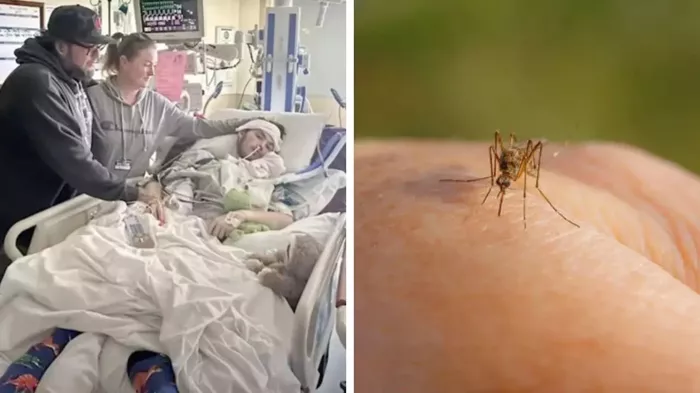A Missouri teenager is facing a dire health crisis after contracting the West Nile virus, which has left him paralyzed from the neck down and reliant on a ventilator. The 18-year-old’s ordeal began with common symptoms such as headaches and dizziness last month but swiftly escalated to life-threatening complications. According to the CDC, preliminary reports indicate that at least 18 individuals in the U.S. have succumbed to the virus this year, which is transmitted through mosquito bites.
A Devastating Turn
The young man, previously healthy, has been left battling severe paralysis and respiratory distress following a mosquito-borne infection. Health officials have identified him as a case of West Nile virus, which is the leading vector-borne disease in the U.S. Although most people infected with West Nile virus experience mild or no symptoms, severe cases like his are rare but can lead to grave outcomes, including death.
Recent months have seen a rise in West Nile virus cases across the country, heightening concerns about its impact. Recovery from severe cases is often prolonged and challenging. The CDC reports that, so far this year, 18 deaths have been attributed to the virus, with a significant increase in cases compared to the previous year’s toll of 182 deaths.
A Tragic Health Journey
According to the teen’s family, his health issues began with typical symptoms such as headache and dizziness, which worsened over time. Despite initial treatment for what was thought to be a tension headache and dehydration, his condition deteriorated rapidly. His father recounted that the teen experienced violent vomiting and high fever, prompting multiple hospital visits. Doctors initially suspected meningitis, but subsequent symptoms—stroke-like manifestations and pneumonia—further complicated the diagnosis.
After being admitted to the ICU and placed on a ventilator, it took over two weeks and the expertise of more than 20 doctors to confirm that the cause of his severe condition was the West Nile virus.
Ongoing Recovery
The virus has severely impacted the teen’s physical capabilities, particularly affecting his left side and mobility. He is unable to stand without support and requires assistance to hold his head up. Despite these challenges, he has undergone a tracheostomy to aid his breathing and has commenced physical therapy to aid his recovery.
Understanding West Nile Virus
West Nile virus is an arbovirus transmitted by mosquitoes, specifically by those that have previously bitten infected birds. It is an RNA virus within the Flavivirus genus, closely related to other viruses such as dengue, yellow fever, and Zika. The virus typically has an incubation period of two to six days following a mosquito bite.
Symptoms of West Nile Virus
Common symptoms of West Nile virus infection include:
High fever
Headache and muscle aches
Nausea and vomiting
Diarrhea
Skin rash
Swollen lymph nodes
Sore throat
Pain behind the eyes
Confusion
Muscle weakness
Seizures
Paralysis
West Nile virus cases have also been reported in Europe, with 13 countries across the continent documenting infections, according to recent data from the European Center for Disease Prevention and Control.
The severity of this case underscores the critical need for vigilance against mosquito-borne diseases. As the virus continues to spread, both in the U.S. and globally, public health experts stress the importance of preventive measures and prompt medical intervention to mitigate the impact of such potentially devastating infections.
Related articles:
Rising Temperatures Spread Deadly Mosquito-Borne Virus To The Northeast
New Concerns As Mosquito-Borne Illnesses Claim Lives In Wisconsin And Illinois
What Is West Nile, The Virus That Make Dr. Anthony Fauci To The Hospital?


